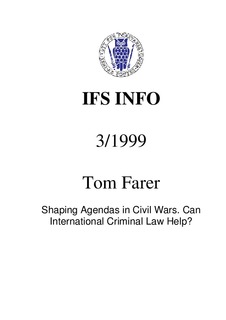| dc.description.abstract | The universalisation of human rights has built a normative order to protect the weak from submission, expulsion or extermination within a country. Enforcement as a vehicle to affect the behaviour of delinquent forces, however, is a far more demanding task. Over a decade states, organisations and coalitions have been threatening or employing military and economic sanctions against brutal governments and factions. This study examines another enforcement vehicle; criminal punishment of those guilty of crimes against their own peoples. Though this might be an admirable initiative, it is not a flawless one. Tom Farer describes, analyses and identifies the obstacles to, and anticipates the consequences of, this initiative. | no_NO |
